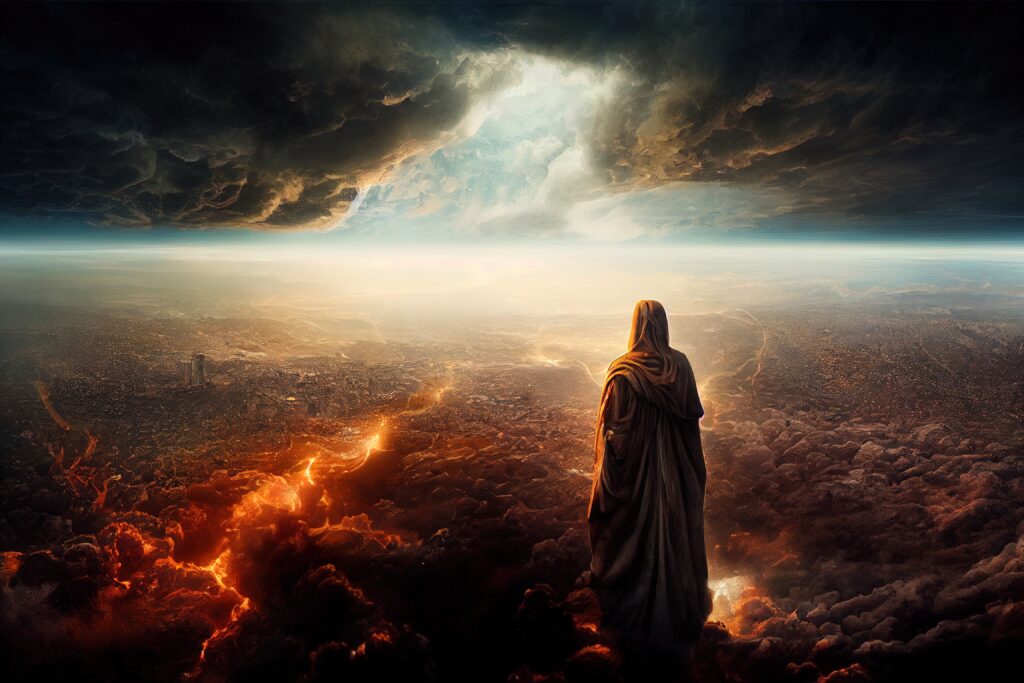
Exciting or Threatening.
The first angel blew his trumpet, and hail and fire mixed with blood were thrown down on the earth. One-third of the earth was set on fire, one-third of the trees were burned, and all the green grass was burned. REV 8:7 NLT
Like the Jericho trumpets, God’s revealed glory is exciting to His children, but threatening to the unsaved and rebellious. This should not concern us when we view it in the context of His amazing love. The reality is that such love causes the hate fuelled violence of sin to stagger and collapse. When the mob came to arrest Jesus in the Garden of Gethsemane, Jesus asked, “Who are you looking for?” to their response He replied (using the divine title), “I am” (‘he’ is supplied by the translators). At that point John records that they all fell backwards because Divinity flashed through His humanity, and they couldn’t stay on their feet. And stubbornly sinful humanity, confronted by such ineffable love also will be laid waste.
History is brutal. The events triggered by the trumpets in Revelation denote God’s intervention in history in response to the prayers of His people. While the seals concern primarily those who profess to be God’s people, the trumpets herald judgments against the inhabitants of the earth (Rev.8:13). At the same time, they are warnings for those who dwell on the earth to bring them to repentance before it is too late.
The seven trumpets cover the course of events from John’s time until the conclusion of this earth’s history (Rev11:15-18).
They are blown while Jesus’ intercession goes on in heaven (Rev.8:3-6) and the gospel is being preached on earth (Rev.10:8-11-11:14). The judgments of the trumpets are partial; they affect only “one-third” of creation. The counterpart of the chiasm (the 7 last plagues) follows the same pattern, but in totality. The seventh trumpet announces that the time has arrived for God to assume His rightful rule. The seven trumpets apply approximately to the same periods covered by the seven churches and the seven seals:
- The first two trumpets herald judgments upon the nations that crucified Christ and persecuted the early church: rebellious Jerusalem and the Roman Empire.
- The third and fourth trumpets portray heaven’s judgment against the apostasy of the Christian church in the medieval period. Islam played a role in this as we shall see.
- The fifth and sixth trumpets describe the warring factions in the religious world during the late medieval and post-Reformation periods. These periods are characterized by increasing demonic activity that ultimately draws the world into the battle of Armageddon.
In case you are wondering – does that mean God caused e.g. the Black Death of the “Medieval Period?” The answer is no. In a previous devotional we talked about how the word of God was lost sight of and the knowledge that would have prevented or minimised the plagues was obscured. God in effect had to stand aside. Man brings his own judgments. Incidentally, the Jews were often blamed for causing the plague because they weren’t being infected. They were following the Old Testament health laws!
The trumpets of Revelation 8 and 9 demonstrate the full extent of God’s love regarding salvation. That love also involves judgement as Psalm 85:10 says, “Unfailing love and truth have met together. Righteousness and peace have kissed!” – NLT.
The troubles triggered by the first trumpet are reminiscent of God’s salvation of His people through the Egyptian plagues (Exodus 7 -11). The second trumpet hints at His passion to protect His people from their wayward path through the prophet Jeremiah (see Jer 51:25,26). The third clearly remembers the moment of salvation when bitter water was made sweet at Marah, yet the reverse occurs here (see Exodus 15:23-25). The fourth recalls the end-time prophecy of Jesus, designed to prepare His people for His return. Every one of these is associated with the deliverance of God’s people from seemingly impossible situations.
But there is more! We have already alluded to these but remind ourselves again now. The first thing is the parallelism of these destructive announcements to the creation story – the earth, the sea, the rivers and the heavens in sequence. The second allusion is to the Genesis flood that washed clean an earlier world corrupted by sin.
Trumpets one to four offer a reverse parallel to creation. What God assembled in Genesis 1 is here being disassembled, but not completely yet. TBC
